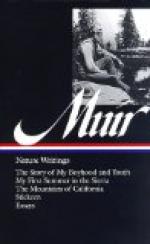Our grammar-school reader, called, I think, “Maccoulough’s Course of Reading,” contained a few natural-history sketches that excited me very much and left a deep impression, especially a fine description of the fish hawk and the bald eagle by the Scotch ornithologist Wilson, who had the good fortune to wander for years in the American woods while the country was yet mostly wild. I read his description over and over again, till I got the vivid picture he drew by heart,—the long-winged hawk circling over the heaving waves, every motion watched by the eagle perched on the top of a crag or dead tree; the fish hawk poising for a moment to take aim at a fish and plunging under the water; the eagle with kindling eye spreading his wings ready for instant flight in case the attack should prove successful; the hawk emerging with a struggling fish in his talons, and proud flight; the eagle launching himself in pursuit; the wonderful wing-work in the sky, the fish hawk, though encumbered with his prey, circling higher, higher, striving hard to keep above the robber eagle; the eagle at length soaring above him, compelling him with a cry of despair to drop his hard-won prey; then the eagle steadying himself for a moment to take aim, descending swift as a lightning-bolt, and seizing the falling fish before it reached the sea.
Not less exciting and memorable was Audubon’s wonderful story of the passenger pigeon, a beautiful bird flying in vast flocks that darkened the sky like clouds, countless millions assembling to rest and sleep and rear their young in certain forests, miles in length and breadth, fifty or a hundred nests on a single tree; the overloaded branches bending low and often breaking; the farmers gathering from far and near, beating down countless thousands of the young and old birds from their nests and roosts with long poles at night, and in the morning driving their bands of hogs, some of them brought from farms a hundred miles distant, to fatten on the dead and wounded covering the ground.
In another of our reading-lessons some of the American forests were described. The most interesting of the trees to us boys was the sugar maple, and soon after we had learned this sweet story we heard everybody talking about the discovery of gold in the same wonder-filled country.
One night, when David and I were at grandfather’s fireside solemnly learning our lessons as usual, my father came in with news, the most wonderful, most glorious, that wild boys ever heard. “Bairns,” he said, “you needna learn your lessons the nicht, for we’re gan to America the morn!” No more grammar, but boundless woods full of mysterious good things; trees full of sugar, growing in ground full of gold; hawks, eagles, pigeons, filling the sky; millions of birds’ nests, and no gamekeepers to stop us in all the wild, happy land. We were utterly, blindly glorious. After father left the room, grandfather gave David and me a gold coin apiece




